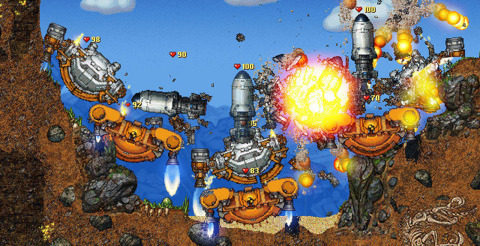Eleven-Year Indie Game: Cortex Command's Long, Strange Trip
The developer of the pixel-physics strategic shooter on what he learned as the indie scene rose, and what took him so long.
A lot has happened in the last 11 years for independent game developers. Steam, the App Store, and console digital distribution have given homebrew projects places to shine alongside the efforts of billion-dollar publishers. Crowd-sourced funding platforms like Kickstarter and inexpensive developer tools like Game Maker and Unity have lowered the medium's significant barriers to entry. The ongoing democratization of development has allowed individuals to earn relevance, respect, and sometimes even a decent living in a field previously dominated by large businesses. Also in the last 11 years, indie developer Daniel Tabar has almost finished his first game.
"I feel like I've gone through several lifetimes working on this thing," Tabar told GameSpot. "It's gonna be such a weird feeling to put 1.0 out this year and finally move on to something else." Cortex Command, Tabar's pixel-physics side-scrolling resource-collecting base-building strategy game, has been in development since the 30-year-old man was in secondary school. The game is set for a summer release, but given the trouble he has already gotten into for missing previous projections, that's as fine a point as he'll put on it.
To be fair, Tabar hasn't exactly been chained to a C++ compiler for the last 11 years. Since he began his work on the game he has moved to the US, enrolled in college, dropped out, taken a developer job at THQ, quit, gotten married, gotten divorced, gotten engaged again, and become a US citizen.
"I just wanted to make this damn game. I didn't sign up for doing all this expectation management for this unknown mob of people."
Tabar said he was naive about how much work was involved in game development, but he kept returning to work on Cortex Command. Despite the frustration of building a complex, multilayered project from the ground up, starting with something simpler would go against his nature.
"I've never been comfortable making small games. I just wanted to make this epic thing."
He felt his intermittent approach was vindicated by the struggles of some of his friends who "were killing themselves" to fit their grandiose ideas into the stricter timetables necessary for publishing on platforms like Xbox Live Arcade. Instead, Cortex Command exists entirely on the PC. With no external publishing deals or deadlines, Tabar turned to his future audience to fund his efforts. But the sales of $18 prerelease copies of the game--even when they were explicitly made "as is" with further development not guaranteed--made some purchasers uncomfortable with his drawn-out approach. Tabar has seen similar problems for developers who use Kickstarter to collect capital for their concepts.
"Now you've got these expectations you have to fill from day one, which is a huge burden," he warned those considering Kickstarting their games. Suddenly the lofty project is a serious obligation. Developers have to dedicate time and talent to keeping the crowd informed as well as to managing backer reward logistics. "That is a lot of distraction from actually making the game, and it's something that I don't necessarily feel I would be so comfortable siphoning off a lot of energy toward. … It's something that I've always struggled with; I just wanted to make this damn game. I didn't sign up for doing all this expectation management for this unknown mob of people."
Even in Cortex Command's own community (within which Tabar has found several new friends and colleagues), comments and forum posts harshly criticized his perceived lack of progress. He felt much of the outrage was disproportionate to his $18 asking price--a testament to unexpectedly strong emotional investments. "I completely understand. It's hard to communicate how I do work, which is in this slow way," he said (at least one gap in his public development log stretches on for a year). "I never even considered giving up on this game."
But it wasn't all placating angry mobs and living from presale to presale. Cortex Command won the technical excellence and audience awards at the 2009 Independent Games Festival along with the associated cash payouts. The game was also included in Humble Indie Bundle #2, thanks in part to Tabar's relationship with its founders.
The coming months are looking even better. Tabar is getting married in Paris on August 17, and his studio, Data Realms (specifically, its one other full-time employee), has already laid out the foundation for its next project: a vehicle-based game that integrates an original, deformable physics engine. With work on the new game revved up, Cortex Command is nearly in Tabar's rearview mirror. But not quite yet.
"This is going to be a very fulfilling experience, I think. I hope. Maybe I'll be depressed instead. Who knows."
Got a news tip or want to contact us directly? Email news@gamespot.com


Join the conversation